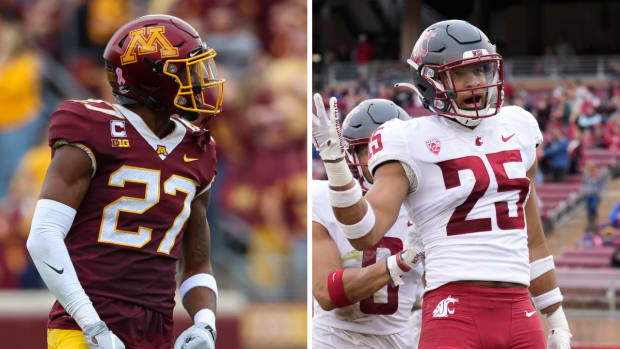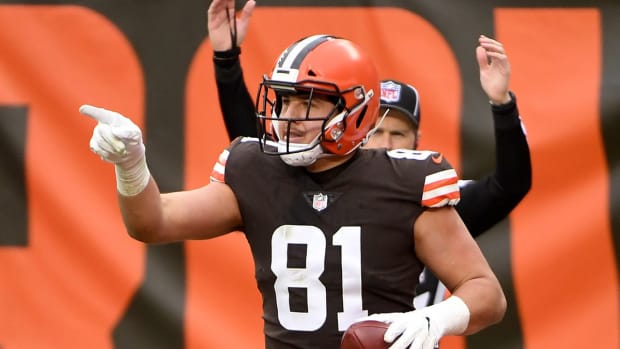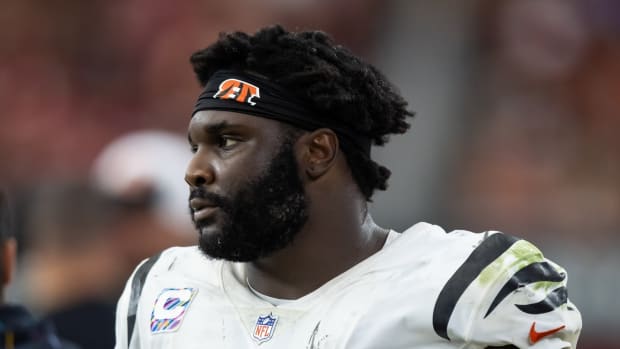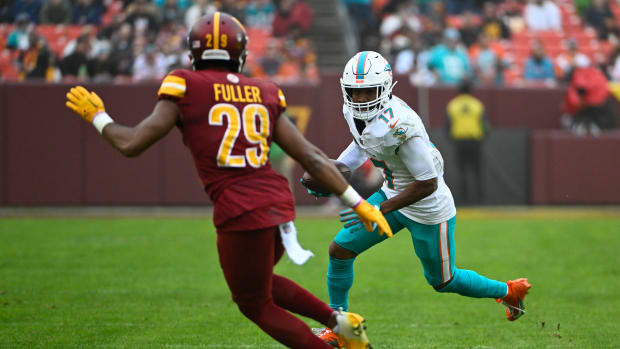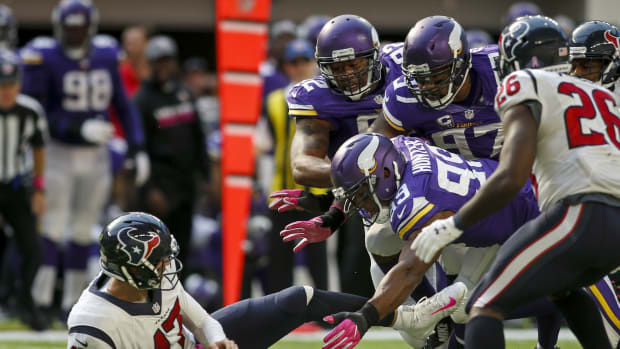How the Coronavirus Is Affecting Free Agents Who Can't Sign Their Contracts
This offseason’s been a tough one for any player to navigate. They’ve had meetings over laptops and iPads, their ability to work out as they normally would has been in the hands of local governments, and that’s without even considering the on-field progress that’s being lost with OTAs and minicamps canceled. Plus that, you know, we’re all dealing with a pandemic too.
Then, you have players like Trae Waynes.
This offseason was the one for Waynes, the one that every NFL player builds his football-playing life toward. After four years in Minnesota, he’d be a free agent, a still-promising young player at a premium position, hitting the market on the front end of his prime, and set to land the life-altering second contract that can set a guy’s family up for generations.
That contract did come. On St. Patrick’s Day, Waynes agreed to a three-year, $42 million deal with the Bengals, complete with a $15 million signing bonus that would account for most of the $20 million he’d earn this calendar year.
The money did not come. Waynes still hasn’t seen a red cent of it.
And no, you shouldn’t feel sorry for him. From what I understand, he’s pretty sensitive to how his concern over a $15 million payment might come off, understanding the job situation in our country right now. In fact, that’s why he didn’t wind up talking to me for this story. But there’s a reality to his situation that we’re going to break down here.
It’s not unique to Waynes or the Bengals. And, very realistically, it threatens to make a dent in the 2020 NFL season.
***
One last GamePlan before camp, and we’ve got a lot to sort through.
• The last installment of our awards series, with my early MVP picks.
• How the Patriots will adjust to Cam Newton.
• Who the canceled preseason games will hurt most.
But we’re starting with the story of Waynes, and what it means for the NFL in 2020.
***
Waynes moved his wife and two kids to Cincinnati in May to get them settled and, he figured, to finalize the deal he’d agreed to in March. The Bengals were among the teams that weren’t allowing third-party physicals—more than half the NFL’s 32 teams aren’t allowing rookies to take those, which is why so many draft picks remain unsigned—and the logical workaround there was to get into town and see the team doctor off-site.
And for Waynes, relocating fully when he did was actually in deference to NFL guidelines, which discouraged players from doing quick trips in-and-out to execute that workaround.
Unfortunately, after he got on the ground in Ohio, Waynes learned that the Bengals weren’t going to be allowing for the team doctor to do the physicals at his private practice, which left the 27-year-old without any other avenue but to wait for the league to reopen facilities to players. That, as most of you know, still hasn’t happened.
Bengals vice president Troy Blackburn said, “We regret the challenges that have arisen this year with processing contracts due to coronavirus. The Bengals are very excited about adding Trae to the roster and are confident that he will be a good player here, but unfortunately issues relating to coronavirus have made contract execution matters harder than anyone wishes. Hopefully agreements can be reached soon between the NFL and the NFLPA that allow the season to get underway, at which point these issues go away.”
And again, Cincinnati’s not the only team doing this. While some teams (Miami, Cleveland, Green Bay) have come up with solutions, a significant number have not. In fact, one agent told me on Wednesday that a team exec leveled with him recently, and said they wouldn’t allow for a deal to be finalized because the owner feared the season could be canceled (if the pandemic worsens) and he didn’t want to pay out cash he may not be able to recoup.
Along the way, Waynes’s agents did go to union lead lawyer Tom DePaso on this, and found that the teams were within their rights to leave deals undone as a result of not wanting to do off-campus physicals.
So Waynes’s situation, really, is a snapshot of a larger problem.
“He moved to Cincinnati, bought a house there, brought his wife and two kids there for the sole purpose that he could drive down to doctor’s private office and get his physical and do a deal,” said Brian Murphy, president of Athletes First, and Waynes’s agent. “He’s got no other reason to be in Cincinnati, because all the offseason workouts were via Zoom. But we thought if he went there, he could get the physical, and it turns out he can’t.”
OK, so why does this matter for you, the NFL fan?
It’s pretty simple. Murphy’s advising Waynes right now the same way any agent would advise a player in that situation: Be careful.
And that’s because, without a signed deal, a serious injury could lead to a couple less-than-desirable outcomes for Waynes. One, the team could honor his contract but put him on the non-football injury list. That would allow them to withhold payment of his signing bonus until he passes a physical, and not pay his base salary while he’s hurt if they don’t see fit. Two, the team could try and back out of the deal altogether (which the agents would, of course, fight).
Then, there’s the possibility the team, the Bengals in this case, does the right thing and honors the deal if there is such an injury. But is it worth the risk for Waynes to count on that, given the amount of money on the line? It is not. So, Murphy says, “I’ve advised Trae not to do any football drills, not to get out there on the field, certainly don’t do any live drills against other people. And my hope is that he’s following my advice.”
“He signed a nice offseason contract to go to the Bengals, be the man in their secondary, make a major contribution, and so under ordinary circumstances, he’d be killing himself to get in the best shape possible,” Murphy continued. “He did do all the Zoom calls. Obviously, there’s no physical activity there, and he’d really want to be in the best shape of life, so he can play the best football of his life. But because of the Bengals’ decision, he can’t do that.
“So yeah, he’s gotta be creative, he’s gotta find different ways to be at peak physical performance. But assuming he’s not doing the one-on-one drills, assuming he’s not battling other players, he’s just not gonna be where he otherwise would be in a normal year.”
Murphy and his colleagues have been creative in the time being. They actually sent TRX straps and workout plans to clients, since those workouts, designed for Navy SEALs and Army Rangers, can be done without much risk for injury.
But there’s only so much they can do. And while free agents with unsigned contracts, like Waynes, are exposed to the most risk, the idea of going on NFI after suffering an injury away from the practice facility is something hanging over the head of every player.
“Every workout is an NFI disaster waiting to happen,” said another prominent agent.
It doesn’t take John Madden to see where this goes next.
With a lot of players being careful in their training this offseason—particularly the ones with unsigned contracts—they’ll be less physically prepared for the intense competition of training camp. And that could lead to injuries. It was a factor in 2011 (Achilles and hamstring injuries were up), and it figures to be again this year.
That’s good for no one, of course—not the team signing the player, nor the player himself.
“This is just adding another layer that doesn’t have to be there,” Murphy said. “So yeah, that’s a valid concern. And they already have to be worried about COVID. Now, you get to training camp, I haven’t had any offseason workouts, and I really haven’t been able to train on my own. And now I legitimately have to go full speed? I don’t know if Trae’s concerned about that, but from his agent’s point of view, I’m very concerned.
“That’s a perfect storm for, knock on wood this doesn’t happen, season-ending injuries to occur.”
So there’s one more log to throw on the burning mess of the 2020 offseason.
***
POWER RANKINGS
And we’ll continue our preseason look at the postseason awards rankings with our top contenders for MVP (Odds courtesy of Oddsshark.com).
1) Texans QB Deshaun Watson (+1800): For me, this is the best play on the board. People think Watson’s situation has gotten markedly worse. It hasn’t. In front of him, he should have a much-improved offensive line, with four top-55 picks at ages 26, 25, 24 and 23 as the foundation, and a proven 28-year-old rounding out the group. The run game, as such, should be good behind David Johnson and Duke Johnson, which helps. And yes, the receiver group loses DeAndre Hopkins, but it’s still got really good balance with Randall Cobb, Kenny Stills and Will Fuller in the ranks. And really, this is my bottom line on it—narratives help when it comes to winning awards. Watson having a huge year in Houston’s first post-Hopkins year is a good one.
2) Seahawks QB Russell Wilson (+900): The last couple years, I’ve thought Drew Brees would be in the running (he finished second in 2018, and got hurt last year), in large part because he’s never won the award. And so now I present to you Wilson—who’s been an annual candidate for the award for three or four years running. He hasn’t yet found that last kick around the quarter pole to get there. But at some point, he will. Maybe this is the year.
3) Kyler Murray, QB, Cardinals (+1000): I’m not sure we can even call Murray a darkhorse candidate anymore, as much as this idea has been thrown around. He’s a second-year quarterback—like Carson Wentz, Patrick Mahomes and Lamar Jackson were for their big runs at the award (only Wentz’s late-season injury prevented him from winning)—and he has a creative offensive coach, and a quickly improving team around him, particularly with Hopkins in town now. Easier said than done, but a bunch of elements are in place for this to actually happen. And even a 10-win season would constitute a massive step forward for the franchise.
4) Tom Brady, QB, Buccaneers (+1200): He has the aforementioned narrative, having switched teams after 20 years. He has Mike Evans and Chris Godwin and Rob Gronkowski and O.J. Howard and Cam Brate. And the bar set last year in Tampa is seven wins. If he gets the Bucs to 11 or 12, I’d expect to hear Brady’s name in the conversation.
5) Patrick Mahomes, QB, Chiefs (+600)/ Lamar Jackson, QB, Ravens (+750): This has nothing to do with how good I think these guys will be. It’s more so a commentary on how good they’ll need to be to win the award. Again, these awards are tied to storylines, and either of these guys just being awesome again probably won’t be enough. They’ll have to top what they’ve done before, and that won’t be easy.
***
THE BIG QUESTION
How different will New England’s offense be with Cam Newton as quarterback, assuming he wins the starting job?
The answer to that: Very. This was a big conversation point during my podcast this week—with my buddies Andy Gresh and ex-Patriots QB Matt Cassel—and I think we all came to the same conclusion, which is that Bill Belichick and Josh McDaniels definitely have the clubs in their bag to get the most out of Newton, and won’t be afraid to use them.
And to prove that, Cassel brought up the same example I’ve been using all week, which played out in September 2016. You may remember that during Tom Brady’s suspension to start that season, the team’s young backup, Jimmy Garoppolo, separated his shoulder. That happened in Week 2, and thrust rookie third-round pick Jacoby Brissett into the lineup. The Patriots’ next game? It happened to be a Thursday nighter, giving Belichick, McDaniels and the staff just three days to pivot and make the offense work for an even younger QB.
In the aftermath of the game, the Patriots were poked fun at for running a “high school” offense for Brissett. Know what? It worked. New England beat Houston 27-0 that night.
Again, this happened with almost no notice, and minimal time to prepare, with the knowledge that if Brissett got hurt (and he did, injuring a finger, just not bad enough to come out of the game), they’d probably have to turn to Julian Edelman under center. If you give McDaniels two months to build an offense that works for Newton? Considering that the Patriots have had to discuss the idea of doing something similar as they assessed guys like Lamar Jackson as potential Brady successors the last few years, I’d bet they’re ready.
And assuming that Newton wins the job, it’ll be fascinating to see what they cook up.
Over the years, we’ve seen the Patriots adjust to the times and the talent on hand at just about every position, and do that at a higher level than anyone else. Outside of short spurts, like the one we described above, they haven’t had to do it at quarterback much. Now, they will. I won’t bet against those guys pulling it off.
***
WHAT NO ONE IS TALKING ABOUT
Who the cancellation of preseason games stands to hurt most.
The simple truth: 2020 is a bad year to be an undrafted free agent, or a player trying to hang on to the fringes of the NFL. You’ve already lost two months of opportunity to stand out in practice. The new CBA has cut the amount of padded practices allowed in training camp from 28 to 16. And plenty of coaches are going to have enough trouble trying to get their starters ready for the opener, before having to worry about some guy fighting for a job.
Unfortunately, with the NFL moving to call off Weeks 1 and 4 for the preseason, those guys are losing even more opportunity, and not just with their teams, but the league as a whole. Those preseason games become resume tapes for a lot of young players who just miss the cut—it’s basically a shot to show the other 31 teams how you fit into the league, and how you match up with other players.
Now, that opportunity gets cut down naturally, with four games becoming two. And the need to prepare the front-line guys may take an even bigger chunk of it away—the starters, like everyone else, will have less practice time this year, and joint practices are out as well, leaving the coaches with much fewer chances to get competitive reps for the guys who’ll be playing the biggest roles in the fall.
“Hate seeing the preseason cut short for all the players that will not get the same opportunity to interview for all 32 teams,” texted one veteran pro scouting director, the other night. “These bubble and long-shot players are lucky to get 40 useable snaps in a four-game preseason. With two games, guys just won’t have the same opportunity to impress teams. Every year there are players that earn an opportunity on what they do in the fourth preseason game alone.”
And that may make cutdown weekend a little staider than it’s been in the past.
***
THE FINAL WORD
I would pay close attention to the government in D.C. working to refuse Washington owner Dan Snyder the right to build a new stadium on the old RFK Stadium site, unless the franchise changes its nickname. Finding the team a new home has been a focus of Snyder’s for some time now, and for reasons that go well beyond nostalgia, the RFK site is widely seen as the most desirable one the team is considering for a new football stadium.
Will blocking the team’s path to returning to the property it called home for 36 years be what finally forces the changes? I believe it could be. Stay tuned to that one.
• Question or comment? Email us.


































